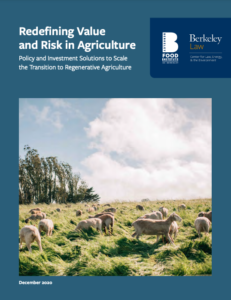Publication – UC Berkeley, Center of Law, Energy, and the Environment

In December 2020, UC Berkeley’s Center for Law, Energy, and the Environment (CLEE) published a report on ways that policy and investment could support the spread of regenerative practices in agriculture. The report is the result of a virtual convening of farmers, policy experts, advocates, and investors as well as months of interviews and follow-up conversations with participants.
The report notes that scaling regenerative agriculture has been a missed opportunity “especially during a global pandemic and recession, when a shift could otherwise drive greater economic, environmental, and food system resilience.” It identifies five critical obstacles to scaling regenerative practices: economic constraints, misaligned policy incentives, structural racism and concentration of market power, lack of consensus and knowledge around regenerative farming, and challenges of achieving land tenure. In addition, the report recommends six strategies across public and private sectors to address these challenges.
| 1) Develop a More Robust Research Base Research institutions should advance the scientific case for regenerative agriculture and standardize measurement protocols
2) Reform Crop Insurance 3) Redefine Risk |
4) Advance State-Level Policies State governments should expand investments in effective existing policies like incentive programs and peer-to-peer support network initiatives
5) Prioritize Equity in Agricultural Policies 6) Urge Landowners and Supply Chain Actors to Enable Regenerative Production |
 We took particular note of the recommendation to reform crop insurance. Conservation and regenerative practices have been shown to reduce agricultural risks and are recognized and incentivized in multiple federal and state programs. The $9 billion federal crop-insurance program, which impacts practices on 80% of the nation’s arable acres, still largely incentivizes conventional practices and commodity crops. Unsurprisingly, this subsidized crop insurance program is slowing the transition of our nation’s food system to a more regenerative model.
We took particular note of the recommendation to reform crop insurance. Conservation and regenerative practices have been shown to reduce agricultural risks and are recognized and incentivized in multiple federal and state programs. The $9 billion federal crop-insurance program, which impacts practices on 80% of the nation’s arable acres, still largely incentivizes conventional practices and commodity crops. Unsurprisingly, this subsidized crop insurance program is slowing the transition of our nation’s food system to a more regenerative model.
To explore the report and all of its excellent recommendations, please click here.